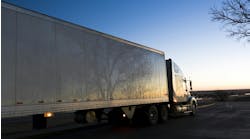The American Trucking Associations (ATA) is continuing to lobby hard against proposed “cap-and-trade” legislation with the support of new Congressional allies. The trucking trade group fears such legislation will only increase fuel costs for truckers without producing any significant reductions in carbon emissions.
“[While] we strongly support efforts to reduce greenhouse gas emissions and make this country more energy independent … the proposed cap and trade system simply will increase the cost of the diesel fuel, while failing to reduce carbon emissions from the trucking industry,” said Barbara Windsor, president of Hahn Transportation and ATA’s first vice-chairman, during a special event in front of the U.S. Capitol.
“The reason that the proposed ‘cap-and-trade’ legislation will not reduce carbon emissions from trucks is rooted in one simple fact – trucking is not a discretionary consumer of fuel,” she added. “Proponents of an economy-wide cap and trade system believe that by increasing the price of fuel, fuel users will either purchase more fuel efficient vehicles or convert to alternative-fueled vehicles. These options are not currently available to the trucking industry.”
“Cap-and-trade is a giant new gas tax on America’s families, farmers and workers,” added Sen. Kit Bond (R-MO) in a speech at the event. “We should not increase pain at the pump in these tough times.”
A report compiled by the offices of Bond and fellow Sen. Kay Bailey Hutchison (R-TX) entitled “Climate Change Legislation: A $3.6 Trillion Gas Tax” claims that cap-and-trade proposals within the Waxman-Markey bill passed in the House of Representatives earlier this year and the Senate’s similar Kerry-Boxer legislation now being debated will add a $2.0 trillion tax on gasoline plus a $1.3 trillion tax on diesel fuel with only “modest carbon emission reductions.”
“We can improve the environment and economy through American ingenuity and technological advancement, not with taxes and mandates that increase costs and burden American families and businesses,” Hutchison said.
“A ‘cap-and-trade’ solution that increases the cost of diesel fuel by $1.3 trillion dollars and does not significantly reduce carbon from the trucking industry is not something our industry can support or our economy can afford,” stressed ATA’s Windsor.
“Any substantial fuel cost increase imposed directly or indirectly on the industry will increase nearly every consumer good – food, clothing, medicine, appliances – at some point in the supply chain,” she added. “As the trucking industry’s costs increase, the price of all of these essential products also must rise.
Cap-and-trade not only would increase the price of diesel fuel, ATA noted, but also increase the volatility of diesel prices, as a fluctuating carbon price is added to an already volatile fuel price, making it very difficult for companies to accurately predict their future expenses as they sign freight delivery contracts, said Timothy Lynch, ATA’s senior vp-federation relations & strategic planning.
In a letter to Congress, Lynch pointed out that the trucking industry uses approximately 39 billion gallons of diesel fuel annually to deliver 70% of the nation’s freight, a rate of petroleum consumption that will continue to be the case for the foreseeable future, even if the price of diesel fuel is dramatically increased by cap-and-trade, he said.


